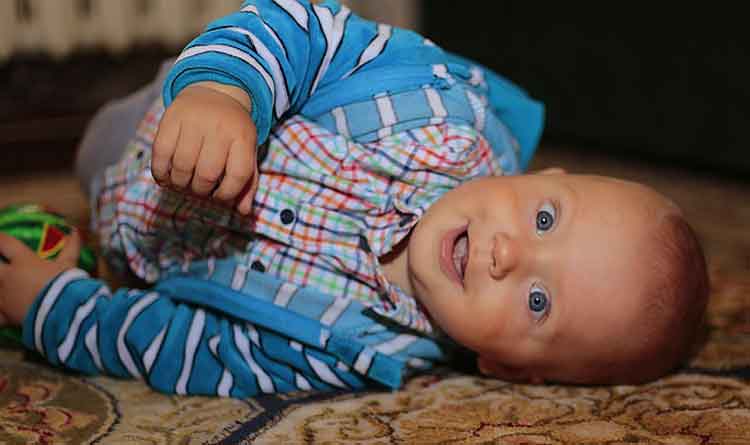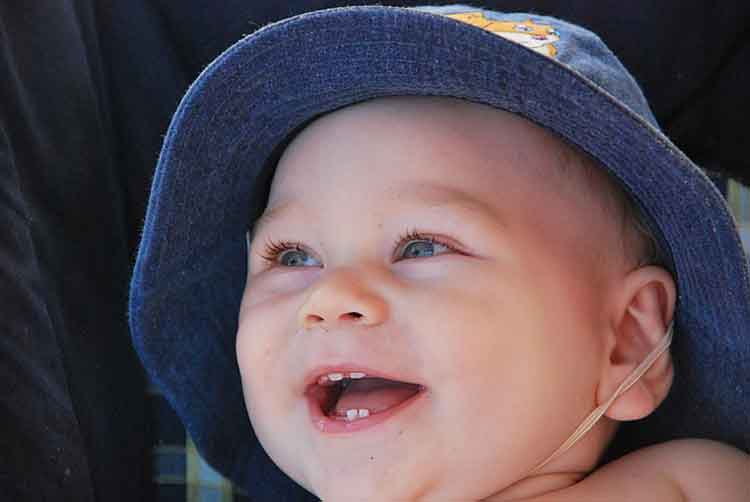Table of Contents
7 Ways to Get Your Teething Baby to Sleep
Teething usually begins four to seven months after birth. Teething is the term for this. As a mother, you may be overjoyed to notice your baby’s teething begin. Teething, on the other hand, causes a lot of pain in youngsters, which can cause a lot of problems, such as difficulty sleeping at night. This article contains some suggestions for relieving your child’s toothache and assisting him in sleeping.

Teething Symptoms in Children
Slicing
Children’s gums hurt a lot when they’re teething, and pressing the gums helps to relieve the pain. As a result, youngsters frequently want to bite or chew whatever falls into their hands to relieve pain, which is quite natural.
Saliva Drip
When teething, children’s saliva flows more than usual. It’s conceivable that your baby’s teeth have started to fall out if you notice that his or her saliva is leaking more than usual. Keep a towel or handkerchief handy to wipe your baby’s chin on a regular basis.
Irritability Is The Third Factor To Consider
Teething toothaches can put a child in a poor mood. During the tooth extraction procedure, your youngster may get irritable.
Sleep Disruption
Children have increased discomfort while teething, in addition to pain. Due to restlessness and pain, the baby is unable to sleep soundly, and you may notice that he wakes up frequently at night or has bad sleep.
Appetite Suppression
Contrary to popular belief, while feeding the mother’s milk, the baby’s gums may experience significant pain, affecting his appetite. Try to reduce the toothache of the baby before feeding the mother’s milk. You may notice an improvement in your baby’s appetite as the pain subsides.
Cheek Rubbing and Ear Pulling
If your baby’s teeth are very painful, you may notice that he mostly pulls his ear or rubs his cheek. This may be due to the common nerves of the cheek and ear. However, keep in mind that if the child pulls the ear too much, then it can also be the cause of infection in his ear.

Also Read: Medha Suktam | मेधा सूक्त | Powerful Mantra for Wisdom, Intelligence, Memory, Brain Power
Ways to Put Baby to Sleep While Teething
If you are a first time mom, you will be given so much advice on parenting that you will be amazed. During this time, if the child’s teeth have started coming out, then he must be feeling a lot of pain in the gums. Due to extreme pain in the teeth of children, their sleep can also be disturbed. Following are some of the ways you can ease your baby’s toothache so that he can sleep properly.
Give the Baby Something Cold to Chew On
A cold item can numb the nerves in your baby’s gums and ease his pain. This is the reason that most of the toy companies nowadays are also making rubber or gel-filled teethers that can be kept in the fridge. Babies are specially given teether to chew on while teething. Chewing teether puts pressure on the gums of babies and this pressure helps in reducing the pain caused by teething.
Children and even animals have a natural tendency to reduce the pain of teething. If you don’t have a toy that you can keep in the fridge, you can also use a clean, frozen cloth instead. Do not store the teether in the freezer as frozen teeth are hard and can cause injury to the baby. Keep it in the fridge to cool it down a bit. Apart from this, if your child is chewing something, keep an eye on it. Teething toys are meant for babies to chew on and not swallow, so keep an eye on them while they are chewing.
Massage Baby’s Gums
Babies can’t sleep alone when they start teething. During this, while putting the baby to sleep, you should massage his gums with your finger. This will reduce the pain and may also help the baby to sleep. You will also feel your teeth coming out when you massage your baby’s gums with your finger. Massage the baby’s gums, especially on the teething area. Make sure your fingers are completely clean before massaging the baby’s gums.
Give Baby Chamomile Tea
Chamomile tea helps reduce body inflammation, relieve abdominal pain, boost immunity, relax and induce sleep. Chamomile tea is more helpful in reducing the pain of the child while teething and induces sleep. Chamomile tea can be given to the baby in a bottle of milk warm or lukewarm. If you want, soak a clean cloth in chamomile tea, cool it in the fridge for a while and then give it to the baby to chew.
However, keep in mind that chamomile tea should not be given to babies under 6 months of age and if your baby is older than 6 months, it is advisable to discuss this with a doctor before giving it. Before giving your baby chamomile tea, check that it is not too cold or too hot. Apart from this, clean your hand thoroughly and then dip it in chamomile tea, then massage the baby’s gums.
Feed the Baby Something Cold before Bedtime
The coolness will reduce the pain in the gums of the baby and keeping the stomach full will help him to sleep. You can give your baby cold yogurt or cold fruits and vegetables, such as grapes or boiled carrots. But keep in mind that you feed the baby according to his age, such as some such fruits and vegetables which he can chew well. You can also buy a mash feeding bag for this. You can use the mash feeding bag to safely feed your baby solid food. With this help, your child does not run the risk of swallowing a large piece of food and getting stuck in the throat.
Create a Quiet Environment for the Baby
It is important for the child to sleep well, to set his bedtime routine. If the child’s sleeping pattern is set, then his body follows the pattern of the rule. Having a set of rules automatically makes the child fall asleep as soon as the time comes, because by doing all the work according to the rule, it signals to him subconsciously that now it is time for him to sleep. It really helps in inculcating good habits in the child. You can add to your baby’s routine by giving her a warm bath, putting on her pajamas, reading a story, singing a song to her, or sleeping until she falls asleep.
Breastfeed the Baby
The baby feels very peaceful after drinking mother’s milk. When a baby starts teething, it can bite while feeding on mother’s milk, which can also cause injury. To avoid this, massage the gums of the baby before feeding. Drinking mother’s milk makes the baby feel calm and also helps him to sleep.
Use Pain Medicine for the Child
Your last option should be to give medicine to the child. If you have tried several methods to reduce the pain in your child’s tooth and they have not helped, then you can give him medicine. The medicine reduces the pain of the child and he can fall asleep quickly. But before using the medicine for children, please consult the doctor. Do not feed any medicine to your child without the advice of the doctor. Pain medicines called ‘ibuprofen’ are specially made for babies and infants from dilute formula, do not give adult medicines to the child at all. Also, consult a doctor before giving any medicine to your child.

Also Watch: Pradnya Vivardhan Stotra, Pradnya Vardhan, Memory Booster & Concentration Mantra, प्रज्ञाविवर्धन
How Long Does Toothache Last In Children?
It is difficult to say how long the pain in children’s teeth lasts. For example, some children may start to have pain several months before a tooth is erupted. However, other children may have pain after the tooth has formed in the gums and as they erupt. Different children may have more or less pain. Most of the time, this pain stops when the teeth start coming out of the gums. By the way, in the first year, the front teeth of children start coming out and the back teeth of the molars start appearing from the first year onwards, so there is a period during which children do not feel pain.
Some Important Information
- If your baby is chewing on the teether or anything else, such as a cloth, toy, or food, keep an eye on it. These things can get stuck in the baby’s throat so be careful.
- Before giving pain medicine to the child, consult a doctor.
- If you hang the teether with a string around your baby’s neck, don’t forget to remove it before putting your baby to sleep. This string can get stuck anywhere while the baby is sleeping or it can even tighten around the baby’s neck when turned on.
- Rubbing aspirin medicine into the baby’s gums is a common but dangerous home remedy. Do not choose this remedy to end your child’s toothache as it can also make him ill.
- Since the child has pain in his teeth, there may also be pain in his ear nerves. This can lead to him not getting used to pulling his ear occasionally.
- Before applying any cream or gel to baby’s gums, consult a doctor. Do not apply any type of gel or cream to her gums without consulting her.
Question Frequently Asked
Should a baby’s sleep training be continued while he or she is teething?
While the baby is teething, sleep training should be continued. It’s important to remember that this ‘stage’ returns after the first year, and it takes about three years for all of the baby’s milk teeth to emerge. Teething might cause you and your baby to have sleepless evenings, but you should keep up with his sleep training. Setting a schedule for your kid and getting him to sleep on time will help him sleep well when teething.
Is It True That Teething Makes Your Child Sleep More?
Some parents have reported that their children slept longer while teething, according to one website. Teething pain can cause babies to become lethargic, causing them to sleep more. There is, however, no proof of this. It’s also possible that your baby’s growth is speeding up, causing him to sleep more.
During this time, the child is in his developmental stage, and while children’s growth is never constant, it can be very rapid or very sluggish at times, which is why this period is known as a “growth spurt.” During their growth spurt, new-borns have been observed sleeping more at any time of day or night. Teething in a baby is a natural process that can be uncomfortable at times. Do what is best for your child, as a mother understands her child very well.
Continue to sleep train the child until then, as he will be completely fine after some time. He will wake up with a charming smile in the morning after a long night’s sleep, forgetting all about the pain and discomfort of teething, thanks to this sleep training.